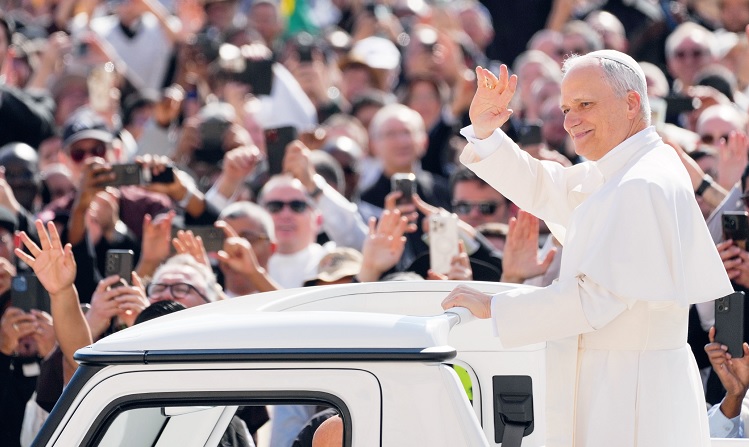Pope Leo XIV officially began his Petrine ministry on May 18, with a powerful appeal for unity, love, and global fraternity during a Mass attended by over 100,000 pilgrims and dignitaries in St Peter’s Square.
May 23, 2025

VATICAN: Pope Leo XIV officially began his Petrine ministry on May 18, with a powerful appeal for unity, love, and global fraternity during a Mass attended by over 100,000 pilgrims and dignitaries in St Peter’s Square. The first American pope, formerly Cardinal Robert Francis Prevost, addressed the world with humility and conviction, setting a clear pastoral tone for his pontificate: “to be a servant of your faith and your joy.”
Quoting the early Church Father St Augustine, a figure central to his spiritual heritage as a former head of the Augustinian order, Pope Leo opened his homily with words that echoed throughout the square: “Lord, you have made us for yourself, and our heart is restless until it rests in you.” This sense of spiritual longing, he said, is precisely what the Church must respond to — not with power or control, but with love, humility, and a deep desire for reconciliation.
Pope Leo was elected on May 8 following the death of Pope Francis, whose passing he called “a moment in which we felt like sheep without a shepherd.” He described the conclave that followed as being deeply moved by the Holy Spirit, “bringing us into harmony like musical instruments,” and shaping a united decision for the future of the Church.
His first public Mass as Pope was attended not only by Catholics but by a wide array of religious representatives — from Christian denominations to Jewish, Muslim, Hindu, Buddhist, Sikh, Jain, and Zoroastrian traditions — a testament to his ecumenical and interfaith vision.
Pope Leo’s core message was unmistakable: The Church must be a “sign of unity and communion, which becomes a leaven for a reconciled world.” In a world wounded by “hatred, violence, prejudice, and economic systems that marginalise the poor,” he said, the Church cannot be passive or divided. “We want to say to the world, with humility and joy: Look to Christ! Come closer to him! Welcome his word that enlightens and consoles!”
Drawing on the Gospel of John and its poignant scene between Jesus and Peter, Leo emphasised the transforming power of divine love. When Jesus asks Peter, “Do you love me more than these?” he uses the word agapáo — a selfless, sacrificial love. Peter responds with philé?, the love of friendship. “Only if you have known and experienced this love of God, which never fails, will you be able to feed my lambs,” the pope reflected. “Peter is thus entrusted with the task of ‘loving more’ and giving his life for the flock.”
This theme of sacrificial love — a love that serves and does not dominate — emerged as a foundation for Pope Leo’s understanding of papal authority. “The Church of Rome presides in charity, and its true authority is the charity of Christ,” he said. “It is never a question of capturing others by force, by religious propaganda or power. Instead, it is always and only a question of loving as Jesus did.”
He rejected any form of clericalism or autocracy within the Church, insisting that leadership must be marked by accompaniment and humility. “Peter must shepherd the flock without ever yielding to the temptation to be an autocrat… all of us are ‘living stones’, called through our baptism to build God’s house in fraternal communion, in the harmony of the Spirit, in the coexistence of diversity.”
That diversity — among cultures, peoples, and religions — is not something to be erased, he insisted, but embraced. “True unity does not cancel out differences but values the personal history of each person and the cultural richness of every people.” This, he believes, is the only path to real peace.
As he concluded his inaugural homily, Pope Leo issued a resounding invitation to Christians and people of all faiths: to join in building a Church that “opens its arms to the world, proclaims the word, allows itself to be made ‘restless’ by history, and becomes a leaven of harmony for humanity.”
“Brothers and sisters,” he declared, “this is the hour for love! The heart of the Gospel is the love of God that makes us brothers and sisters. Together, as one people, as brothers and sisters, let us walk towards God and love one another.”
With these words, Pope Leo XIV stepped fully into his role as shepherd of over a billion Catholics, offering not only direction for the Church but hope for a fractured world in search of peace, purpose, and unity. –Agencies